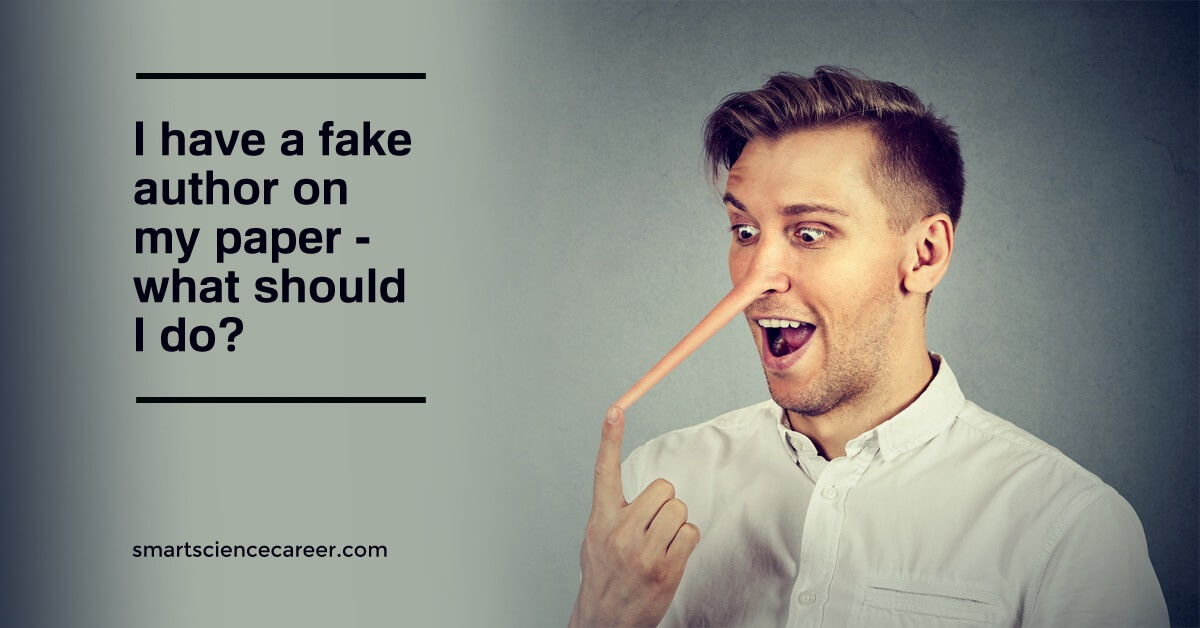I have a fake author on my paper – what should I do?
Young scientists often struggle with the problem of being obliged to include authors in the author list who may not have contributed substantially – or not all. In particular, partners who only provide technology, patient samples, genetically modified organisms, or general infrastructure may be a reason for debate, although the research would be impossible without their contribution. How can you handle this problem?
The ethicist gives unpopular advice
When asking an ethicist, the answer is often apparent – colleagues who only contributed to the project by providing technology, patient samples, genetically modified organisms, or general infrastructure should not be authors – they should be mentioned and thanked in the acknowledgment.
In response to this conservative idea, the standard reaction of young scientists typically lacks enthusiasm. Classical replies are:
“Great! Do you really think I will inform the dean of our faculty that he will not be on my paper anymore…? I do not want problems.”
“If I do not include colleague X he will not provide the patient samples I desperately need for my research… This means that I will not get my thesis done…”.
Thus, young scientists should understand what a substantial contribution is – and learn to handle the dilemmas that come with the strict rules.
Be pragmatic?
In other words, young scientists are often in a dilemma, and the advice of ethicists makes it worse. In contrast, supervisors tend to advise a PhD student to be ‘pragmatic.’
This means ignoring the ethical dilemma, adding the colleagues to the author’s list, and channeling their creativity into composing a convincing “description of each author’s contribution,” which is nowadays requested by many journals, particularly biomedical ones.
Ultimately, the PhD students stop thinking about this ethical dilemma and continue the ‘pragmatic approach’ in their next job.
However, is there a better way?
Which rules should I follow?
There are very clear guidelines to help you decide whether a person should be on the author list of your publication. For example, the International Committee of Medical Journal Editors (ICMJE) has provided guidelines to help researchers decide whether a contributor qualifies to be an author or should be included in a manuscript’s acknowledgments section.
“The ICMJE recommends that authorship be based on the following four criteria:
- Substantial contributions to the conception or design of the work or the acquisition, analysis, or interpretation of data for the work; AND
- Drafting the work or revising it critically for important intellectual content AND
- Final approval of the version to be published AND
- Agreement to be accountable for all aspects of the work in ensuring that questions related to the accuracy or integrity of any part of the work are appropriately investigated and resolved.”
“All those designated as authors should meet all four criteria for authorship, and all who meet the four criteria should be identified as authors.”
Accepting the final version and accountability
The third and fourth points usually are not a problem. Every author will approve the final version – even without reading the paper. Every author will also agree to be accountable – although many authors are not fully aware of the consequences this responsibility implies in cases of scientific fraud.
According to these criteria, all authors are held accountable, even when they have no idea about the fraudulent activities of other co-authors.
The ethicist Wim Pinxten kindly explained: “Accountability does not equal guilt. It is up to potential investigations about scientific misconduct to clarify whether authors have acted responsibly and in good faith, or whether they have been negligent or guilty to the conduct of improper scientific practice’.”
However, most authors will approve the final version and agree to be accountable for all aspects of the work without further consideration.
What is the problem with the ICMJE guidelines?
The problems start with the following statement of the ICMJE guidelines: “Contributors who meet fewer than all 4 of the above criteria for authorship should not be listed as authors, but they should be acknowledged.” Thus, those authors who do not meet all four criteria should be moved to the acknowledgments section.
Why is this a problem?
Acknowledgements have no value in science – authorship does. Read more here: What is the best publication strategy in science? and How to become a professor?
The strict guidelines mean that the following persons do *not* qualify:
- Contributors who only provide technical help, lab space, tissue samples, or reagents – even when the study would not be possible without their contribution.
- Contributors who only rewrite the paper and improve the discussion – even when this contribution is substantial (time, energy, background knowledge, etc.).
What does it mean to be an author?
Ethicist Noémie Aubert Bonn pointed out that my view of authorship as an “investment in your career” is a rather limited perspective. She pointed out to me that having an author’s name, correspondence, and affiliation on a paper may have other motives than just career advancement that are genuinely useful and that should not be forgotten.
For example, indicating the corresponding author gives the reader the possibility to know whom to contact in case of questions; author names permit researchers to guide their searches and to orient their readings, and journalists to contact people for interviews, and affiliations help students and young researchers to find institutes that do research they find interesting, etc.
Finally, beyond the fame, the recognition, and the advantages of being an author, there is also a duty to understand, critically appraise, and be able to explain and justify the study, its methods, and its conclusions. I have to agree (because I always agree when an ethicist criticizes my limited perspective).
What are “fake authors” anyway?
In the context of this article, anyone who has not contributed “substantially” to a study is considered a fake author – however, the definition of a “substantial contribution” is vague.
Many scientists argue that there is a big difference between authors who have been included in the authors list because they are simply higher in the hierarchy (head of department, dean, rector, etc.) and colleagues who provide direct support such as patient samples or access to a high-class technology – although neither may have read the paper.
The head of department or dean may argue that they provide the infrastructure that makes the research possible. Thus, there are several layers of fake authors:
- People who have not contributed at all (for example, friends or important political partners of the senior author) – these are without doubt fake authors
- People higher in the hierarchy who provide infrastructure in general. Here starts the debate. Some would agree that this contribution is insufficient, but it is still common in many countries.
- People who provide concrete technical input (patients’ samples, animal models, technologies, etc.). Many people would consider such a contribution worthy of co-authorship, although it does not conform with the ICMJE authorship recommendations. Thus, this is a challenging debate.
Lying or opening the debate about the rules?
Because many scientists cannot perform their research without colleagues who provide this kind of support, many simply lie when composing the contributions of authors who provide technical input.
It is, therefore, important to debate whether these author criteria are still valid when the researchers in the real world disagree with them.
However, until this is resolved, scientists have to live with these guidelines and with the necessary contribution of colleagues who do not qualify for all four criteria.
… but how can you behave ethically without destroying your scientific career?
Solution: Let them contribute intellectually
In order to solve this problem, we advise our PhD students to ask those authors who do not fully qualify for the first or the second point to make a ‘substantial intellectual contribution’ to the work. The key word is ‘substantial’.
It is not clearly defined what a ‘substantial contribution‘ is. Supervisors should guide young scientists to define when a minimal contribution can be considered “substantial.” Unfortunately, there are no clear criteria, and every author has to make this decision himself/herself. On the other hand, this gives a lot of freedom.
A small but substantial intellectual contribution in addition to the technical contribution may sufficiently qualify the co-author(s) in question.
Pragmatic advice is to ask the contributors the following:
1. To help a bit with the interpretation of the data and
2. to critically revise the final version.
In most cases I know, the potential co-authors are interested enough to provide this kind of input and qualify sufficiently because they need the co-authorships for some kind of scientific career.
Several ethicists I have asked agreed that this strategy is an acceptable way to transform a ‘fake’ author (according to the four criteria) into a qualified author. Of course, this does not work with real fake authors who want ‘fame’ without any contribution.
Acknowledgments
Thanks a lot to Noémie Aubert Bonn for critical comments on the first version and Wim Pinxten, who helped me understand the difference between “accountability” and “guilt” of co-authors in cases of scientific fraud.
I have used AI systems, including Grammarly, Google Gemini, and ChatGPT, to enhance the English and comprehensiveness of this article.
Recommended reading
The following articles may also interest you:
- Is being a professor worth it?
- What is tenure?
- What is a substantial contribution to a paper?
- 28 Tips to Get More Citations for Your Publications
- How To Write Faster: 19 Efficient Ways To Finish My Publication
- Should I have senior authorships as a postdoc?
- Should I aim for co-authorships on high-impact papers?
- Should I aim for multiple co-authorships to extend my publication list?
- Should I publish negative results, or does this ruin my career in science?
- 10 simple strategies to increase the impact factor of your publication
- What is the best publication strategy in science?
- Corresponding author versus senior author – what is the difference?


